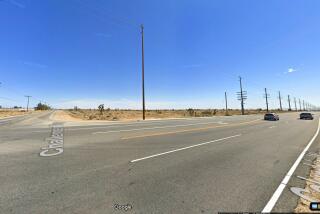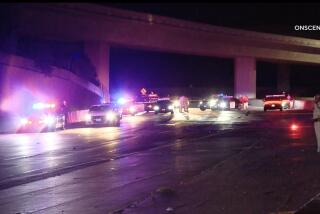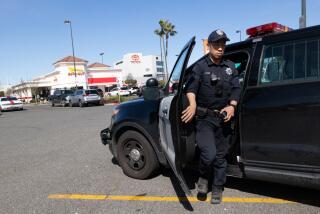CHP Leaders Ask Public to Keep Faith, Trust in Patrol Officers
One day after a veteran California Highway Patrol officer was arrested on suspicion of murdering a 20-year-old college student, shaken CHP officials on Friday appealed to the public to have faith in the agency and to respond without fear to requests or commands from its officers.
“Our whole system will not work unless people cooperate with the police and trust us. They don’t really have any choice but to trust us,” said Ben Killingsworth, chief of the CHP’s border division, to which the arrested officer, Craig Alan Peyer, was assigned.
Peyer, 36, was arrested Thursday night in connection with the death last month of Cara Evelyn Knott, a San Diego State University student whose body was found in a creekbed off Interstate-15 near Poway Dec. 28. Knott was strangled.
Killingsworth and other patrol officials--including Highway Patrol Commissioner James E. Smith--said in interviews Friday that Peyer’s arrest should not reflect on the performance of the agency’s 4,700 patrol officers and 1,000 supervisors. The patrol makes more than 4 million traffic stops a year.
“We make millions of stops every year, and the organization is staffed with people who are professional and competent and trustworthy,” said Kent Milton, commander of public affairs for the CHP. “If, in fact, this one time that didn’t happen, I think the public can look at it as an extreme exception.”
Smith added: “We cannot control the action of every individual in every case. We cannot be certain of what a human is going to do. But the organization will proceed as we have in the past in terms of practice and policies.”
Milton said motorists should not be reluctant to pull off a freeway and onto a ramp or frontage road if asked to do so by an officer, as San Diego police investigators allege Peyer instructed Knott. Milton said such a practice is used when an officer decides that stopping on the freeway would be unsafe.
Milton acknowledged that, particularly in the aftermath of Peyer’s arrest, some people might fear leaving the safety of their cars at night.
“Women, perhaps anybody, may feel much more comfortable staying in the car with the door locked and rolling the window down a bit, and that’s perfectly acceptable,” Milton said.
But what if an officer instructs you to get out of your car?
“Get out of your car,” Milton advises.
Smith added, however, that motorists should feel free to request permission to drive to a nearby, safe location, such as a restaurant or well-lighted parking lot, before talking to a patrol officer. But he said such permission may not be granted, especially if a person is suspected of driving under the influence of drugs or alcohol.
If motorists are unhappy with the way they are treated by a patrol officer, they should contact the nearest CHP office, where the complaint will be taken and investigated.
Milton said the complainant and the officer involved will be interviewed, and the incident written up in a report, which is sent to the officer’s supervisor for a decision.
“This is a very carefully developed and carefully operated procedure which I think is considerably more comprehensive and defined than it would be in any other class of business,” Milton said.
Killingsworth said Peyer’s colleagues in San Diego were “devastated” when told of Peyer’s arrest Thursday.
“They were told we expected them to go ahead and do their jobs and just keep on as they had, and they were told that as individuals they had nothing to be ashamed of, that they were still the same people they were the day before,” Killingsworth said. “We have complete confidence in them. We told them they could expect some comment from some of the public and just expect it and deal with it with understanding. They did that.”
Killingsworth said officers reported no adverse reaction from the motorists they stopped Friday. He said the Pacific Highway office where Peyer worked received 30 to 40 telephone calls from citizens regarding the matter, and about 75% of them were “positive.”
More to Read
Sign up for Essential California
The most important California stories and recommendations in your inbox every morning.
You may occasionally receive promotional content from the Los Angeles Times.










